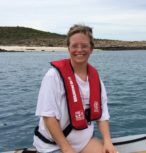DNA reveals the past and future of coral reefs
New DNA techniques are being used to understand how coral reacted to the end of the last ice age in order to better predict how they will cope with current changes to the climate. James Cook Univer

From 2005 to 2022, the main node of the ARC Centre of Excellence for Coral Reef Studies was headquartered at James Cook University in Townsville, Queensland (Australia)








Most of the world’s coral reefs are periodically exposed to heavy seas generated by tropical cyclones which can cause major structural damage to corals that, over time, can play a key role in shaping coral reef and associated fish communities. However, cyclone wave exposure, when appropriately timed and located, can also help corals by lowering rising and/or high thermal stress enough to reduce or prevent coral bleaching. This happens when cyclone wave action causes upwelling of cooler waters to the surface if water depth is sufficient. While direct in situ observations of cyclone waves are rarely possible, reliable methods exist to spatially reconstruct both their likely damaging wave zones and their potentially beneficial ‘cool wakes.’ These can be used to build disturbance histories of cyclone impacts at reefs over the recent past, and with synthetic cyclone tracks from climate models, into the future. I will present examples of these datasets that range from relatively coarse to fairly detailed for a variety of regions and show how they have been (or are being) used in studies on the Great Barrier Reef, the Coral Sea, NW Australia, and beyond. Such datasets are key not only for untangling the mix of causes of coral loss at any given time in a reef system, but are also essential inputs into the spatial prioritisation of conservation action.
Bio: Marji is a spatial-ecological data scientist based at the Australian Institute of Marine Science’s Perth office. In between designing field surveys and using models with field data to map benthic habitats in NW Australia’s remote offshore estate (and coordinating on-line Atlases!), she investigates tropical cyclone impacts on the world’s coral reefs now and under future climates to support spatial prioritisation of conservation action. Marji is part of GBRMPA’s Tropical Cyclone Risk and Impact Assessment Plan, and provides quick response estimates of the likely spatial extent of severe wave damage to GBR corals when cyclones track near or through the region. She completed her PhD at JCU in 2005 while teaching GIS full-time in the department formerly known as Tropical Environmental Studies and Geography. In her spare time, she runs an educational outreach program that asks kids ‘what do penguins and coral reefs have in common?’. In January 2019, she ventured to the bottom of the world on a ship through 12m seas to explore the Antarctic Peninsula with 80 women scientists as part of the international women’s leadership program Homeward Bound.
New DNA techniques are being used to understand how coral reacted to the end of the last ice age in order to better predict how they will cope with current changes to the climate. James Cook Univer
A new study on the effects of climate change in five tropical countries has found fisheries are in more trouble than agriculture, and poor people are in the most danger. Distinguished Profess
James Cook University researchers have found brightly coloured fish are becoming increasingly rare as coral declines, with the phenomenon likely to get worse in the future. Christopher Hemingson, a
Researchers working with stakeholders in the Great Barrier Reef region have come up with ideas on how groups responsible for looking after the reef can operate more effectively when the next bleaching
Abstract: As marine species adapt to climate change, their heat tolerance will likely be under strong selection. Individual variation in heat tolerance and its heritability underpin the potential fo
Abstract: The Reef Ecology Lab in KAUST’s Red Sea Research Center explores many aspects of movement ecology of marine organisms, ranging from adult migrations to intergenerational larval dispersal
Abstract: Macroalgal meadows are a prominent, yet often maligned component of the tropical seascape. Our work at Ningaloo reef in WA demonstrate that canopy forming macroalgae provide habitat for ad
Abstract: Sharks are generally perceived as strong and fearsome animals. With fossils dating back at least 420 million years, sharks are not only majestic top predators but they also outlived dinosa
Abstract: Connectivity plays a vital role in many ecosystems through its effects on fundamental ecological and evolutionary processes. Its consequences for populations and metapopulations have been
Abstract: Evolution of many eukaryotic organisms is affected by interactions with microbes. Microbial symbioses can ultimately reflect host’s diet, habitat range, and even body shape. However, how
Abstract: The past few years have seen unprecedented coral bleaching and mortality on the Great Barrier Reef (GBR) but the consequences of this on biodiversity are not yet known. This talk will expl